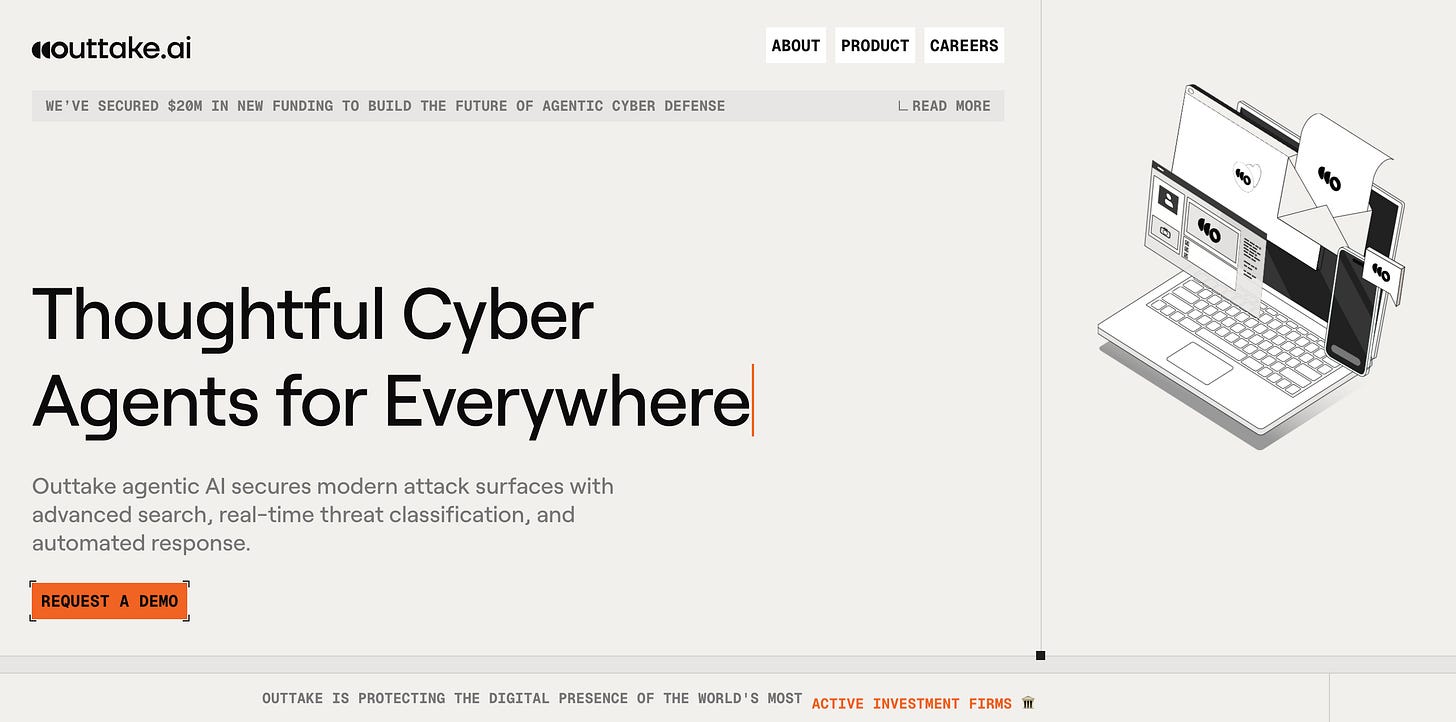Revenue Comes Second.
Leading indicators vs false flags, Outtake's Series A
The problems with becoming a “number go up” machine too early
Historically revenue is a lagging indicator of value creation. Do something novel and important for your customers first, and the revenue (value capture) should follow second.
But now, revenue is often a leading indicator of value, hypothesis validation, and PMF - sometimes even a false flag.
Many of the super fast-twitch vertical AI companies get lots of revenue quickly off the back of some combo of agents replacing people/BPOs, easy implementations, and experimental use cases/budget without PROVING anything at all.
In the 2021 boom, the narrative was “the traction is tiny but we think it’ll keep running and be super high quality” (they were mostly wrong). In 2025 the narrative has flipped to “yeah there’s great traction but I’m not sure it’ll last or be quality” (and sometimes it won’t!).
Millions or even tens of millions of dollars in revenue can materialize without/before demonstrating quality, durability, or value creation. They’re often scaling without knowing if they have something worth doing at scale. Sometimes that revenue will disappear just as quickly!
These companies are (implicitly or explicitly) being run themselves as “number go up” machines instead of “true, false” experiments.
The problem with a “number go up” mentality too early in a company’s life is that
it prioritizes optimization and acceleration off a small base without necessarily answering what you’re doing or why it matters
it can create the delusion/illusion of success without getting to a step change that unlocks more capital and the next set of problems/opportunities
Early stage companies should be constantly graduating from one set of true/false propositions to the next rather than optimizing for throughput alone.
Validate a thing, which unlocks an opportunity, that can turn into a business
At some scale, most businesses turn into win/lose propositions. Really great companies keep finding true/false bets along the way. But even if revenue is a leading indicator of value instead of a lagging indicator, you still need to proving the value creation story. With that, value capture (growth) will be empty calories and run out.
Venture is great for funding falsifiable experiments with definitive outcomes. If you can’t orchestrate a test with a true/false outcome, don’t raise venture.
Outtake’s Series A
AI is introducing totally new vectors for fraud: spear phishing, impersonation, cloned apps and websites, etc. are all now easy to scale. These new problems require totally new solutions. Outtake is building them.
From The Information:
The 12-person startup has developed software, otherwise known as AI agents, that can inspect code on a website that’s pretending to be the official homepage of a brand, for instance, to detect whether it’s malicious. The company’s software can then quickly draft legal documents—a process that previously required hiring an expensive lawyer—to ask the website hosting company to take down the site, founder and CEO Alex Dhillon said.
The rise of phishing attacks and scams aided by LLMs has helped Outtake grow its annual recurring revenue to several million dollars since its founding in October 2023, Dhillon said. (The
Megan/we/Slow seeded the business ≈18 months ago and it’s now raised a $16M Series A led by CRV. Outtake is led by an electric team from Palantir and is hiring for a founding AE, an AI-focused SWE, and an office manager (part time). This is a rocketship; find your seat.
Abundance
This week, we were all libs. Trump wants to turn us into a third world country he can more easily control and reshape but we (and the markets) remembered that free trade is the basis for modern wealth and prosperity. Without high trust, mutual relationships with our trading partners we can’t possibly hope to solve global challenges and create innovative solutions.
The damage of the last week won’t be easily undone, at least for as long as our leaders keep looking at the world as zero sum fights. That is the definition of a scarcity mindset.
Trade makes us all better off and comparative advantage lets us create enough for everyone.
You should also read Catherine Vaughan’s post “What is an Abundance Democrat?” Very helpful framing on the current moment and positioning.
I Read
Klarna Chameleon - Net Interest
Where Will We Eat When the Middle-Class Restaurant Is Gone? - NYT
I Wrote
What happens to early stage now? What should founders do? This might be already outdated (tariffs on pause) but I think the key message is true. No matter what happens in the macro, the job for founders stays the same. The goal as ever is to use risk capital to test a hypothesis, turn over a card(s), and unlock something novel and important on the other side.





It is interesting that because OpenAI set the expectation that AI services are paid, there's a huge umbrella for startups to build paid products and users are willing to throw $20/mo and just about any AI service for a little while to see if it's valuable. Sort of the opposite of what happened with mobile apps.
This is a great read for early founders trying to prioritize what to focus on. Create real value first!